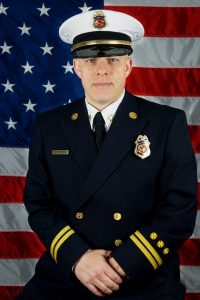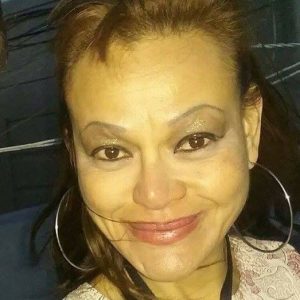Washington, DC – Congressmen Mark DeSaulnier (D -CA11) and Doug LaMalfa (R-CA1) issued the following statement after introducing H.R. 3907, the Federal Wildland Firefighter Recognition Act. This bill will direct the Office of Personnel Management (OPM) to allow those who risk their lives fighting wildfires to be called “Wildland Firefighters.”
“Each year in California and around the country dedicated men and women put themselves in harm’s way to prevent, prepare for, and help fight the spread of wildfires. As thousands of acres currently burn in California, these specialized public servants deserve to be appropriately recognized as ‘Wildland Firefighters’ for helping to protect our landscape and the surrounding communities,” said DeSaulnier.
“Due to misguided forestry management practices that don’t allow for thinning and other prevention strategies, our forests are being consumed by wildfires at an alarming rate. Each year, thousands of firefighters risk their lives to protect our forests and property from the spread of these fires. They are known by titles such as ‘Wildland Technician’ and ‘Forestry Technician’ – vague terms that don’t reflect the scope of their duties. H.R. 3907 ensures these men and women are recognized by the proper title and terminology. When a destructive fire spreads quickly through woodlands, we call it a wildfire. When someone fights it, they deserve to be called a Wildland Firefighter,” said LaMalfa.
Since their establishment in 1910, 1,086 wildland firefighters have died protecting American homes, forests and National Parks from wildfires. Despite their dedication, these brave men and women are not able to call themselves Wildland Firefighters. Federal agencies instead use a variety of bureaucratic terms that do not reflect the dangerous work that these personnel do, such as “Wildland Technician” and “Forestry Technician.” H.R. 3907 directs OPM to develop a separate and distinct Wildland Firefighter occupational series for employees whose main duties and responsibilities are preparing for, reducing fuels for, and the suppression of wildfires.
Read MoreBy Bryan Scott
Residents of Eastern Contra Costa County are being poorly served by local politics. It is as clear as the nose on your face, to use a hackneyed cliché, and was illustrated earlier this month at the East Contra Costa Fire Protection District (ECCFPD) Board meeting.
During the month of September ECCFPD had no resources to respond to emergency calls for a total of 16 hours and 33 minutes, it was revealed at the Board of Directors meeting on September 2.
According to the Operational Update, delivered to the Board by Interim Battalion Chief Ross Macumber, six calls came in during this period, and all were calls for medical assistance.
“Sixteen hours and 33 minutes without coverage, that’s a new record for the district,” said Director Joe Young.
Joel Bryant, ECCFPD Board President and Brentwood Vice Mayor, also commented on the situation.
“It’s a bad situation that we’re in,” he said, referring to September’s lengthy time period when 114,000 residents were without ECCFPD fire and emergency medical services coverage.
Six 9-1-1 calls came in during the period when ECCFPD was unresponsive, and all were for medical assistance. Responses to the calls came from Contra Costa County Fire Protection District (ConFire) and the California Department of Forestry and Fire Protection (CalFire).
The Operational Update does not indicate the locations where these first responders came from, or how long it took to arrive on scene at these medical emergencies. What impact this delayed response time had on each of the medical outcomes was also not included in the report.
Fire and emergency medical services in East County are funded at just $94 per person, while residents in central parts of the county have the same services funded at rates of $370 and $449 per person, according to a June 2016, LAFCO report. Funds are distributed to government entities based on state law.
The fire district’s low funding rate has caused ECCFPD to cut staff and close fire stations at a time when East County is experiencing significant residential and commercial growth.
A government Task Force and the CCC Grand Jury have both reported extensively on the funding crisis, while Assembly Member Jim Frazier has called the situation a “public safety emergency.”
One solution to the problem is the reallocation of currently collected property taxes. A recent memorandum prepared by ECCFPD legal counsel outlined the history of other such state-directed funding changes, and found no legal barriers.
But would the Directors of ECCFPD the support such a solution?
All nine members of the Board are appointed by other government agencies that would lose funds, should a reallocation effort be implemented. Two Board members, President Joel Bryant and newly-appointed Director Susan Morgan, serve on the legislative bodies of other government agencies which receive property tax funds.
President Bryant is the Vice Mayor of the agency that appointed him to the fire board, the City of Brentwood. And Director Morgan, appointed to the fire board by Oakley, is President of the Ironhouse Sanitary District Board of Directors.
Any funds reallocated to the fire district would come from these, and other, government agencies. Is there a conflict of interest here?
For six hours and 36 minutes on the Labor Day Holiday, Monday, September 4, when four emergency calls came in, the ECCFPD service area of 249 square-miles was without ECCFPD coverage.
And yet at the October ECCFPD Board meeting, over two and one-half hours in duration, no discussion of ways to improve funding took place.
Just how interested in improving district funding is this Board?
Brentwood resident Bryan Scott is Co-Chair of East County Voters for Equal Protection, a non-partisan citizens action committee striving to improve funding for the ECCFPD. He can be reached at scott.bryan@comcast.net, or 925-418-4428. The group’s Facebook page is https://www.facebook.com/EastCountyVoters/.
Read MoreDetectives from the Contra Costa County Office of the Sheriff are continuing to investigate a homicide in Byron. The victim has been identified as 37-year-old Emily Courchesne of Danville.
On Friday morning, October 6, 2017 at about 10:05, Deputies were dispatched to a “Medical – PD” call at a residence on the 24000 block of Marsh Creek Road in Byron. Deputies found Courchesne deceased inside the home. Detectives later determined it was a homicide. An autopsy is scheduled for Monday.
Anyone with any information on this case is asked to contact the Investigation Division at (925) 313-2600 or call the anonymous tip lines at (925) 313-1166 or (866) 846-3592. Tips can also be emailed to: tips@so.cccounty.us.
Read MoreAssemblywoman Catharine Baker (R-San Ramon) announced this week, Governor Jerry Brown has signed her Assembly Bill 953, which will help protect the privacy of victims of child abuse and domestic violence in court proceedings.
Many times, when a minor is the victim of sexual abuse, a restraining order is filed in civil court to prevent the situation from escalating before the matter is heard in a criminal court. This measure extends the privacy provisions already available for victims in criminal courts to those victims in family courts and for civil protective orders in civil court.
“This law removes a significant roadblock for some of our most vulnerable victims who need the assurance of confidentiality in order to fully access our court system and get protection from further or escalating violence and exploitation in cases involving domestic abuse and human trafficking,” says Dana Filkowski, Domestic Violence Supervisor of the Contra Costa County District Attorney’s Office.
Under this bill, victims and their guardians would be able to request that minor victim’s name, address, and circumstances surrounding the case are confidential in court documents. This bill gives judges in the civil setting the authority to order documents be filed under seal, and ensures that the sensitive information would be kept in a confidential case file available to law enforcement only for the purpose of enforcing the protective order.
“When working with teens who have experienced cyber-harassment or children who are victims of sexual abuse, we see how difficult and traumatizing it is for these children to seek and get help. We also see the clear need for them to keep their identity and what happened to them private and confidential. AB 953 recognizes the need to protect these children,” says Susun Kim, Executive Director of Contra Costa Family Justice Center.
Confidentiality is given to victims of sex crimes, human trafficking, child abuse, and domestic violence in criminal investigations and prosecution. This bill will allow these same protections to be extended to victims in civil lawsuits and investigations. Encouraging more access to and participation in these systems allows for early intervention and enhanced protections for victims whose cases still need protection from further escalating abuse.
“AB 953 will keep victims safer by keeping their information confidential. Victims deserve to feel safe using our system, and this bill will do that,” said Assemblywoman Baker.
AB 953 was supported by the Contra Costa County District Attorney’s Office, Family Justice Center, Crime Victims United of California, California Sexual Assault Investigators Association, and the California Police Chiefs Association, Inc. This bill received unanimous, bipartisan support in both the Senate and Assembly prior to receiving the Governor’s signature.
Baker represents the 16th Assembly District, which includes the communities of Alamo, Danville, Dublin, Lafayette, Livermore, Moraga, Orinda, Pleasanton, San Ramon, and Walnut Creek.
Read More
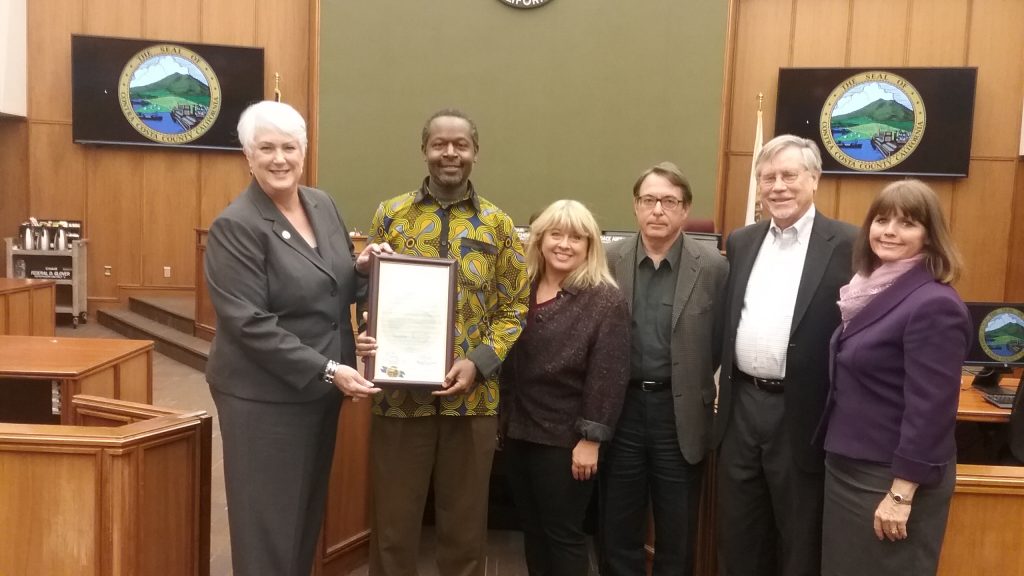
At the presentation were, from left, Supervisor Karen Mitchoff, Riaunda, Supervisors Diane Burgis and John Gioia, Contra Costa County Health Services Director Dr. William Walker and Supervisor Candace Andersen. Photo by Daniel Borsuk
By Daniel Borsuk
At their meeting on Tuesday, Sept. 26 the Contra Costa County Board of Supervisors recognized Ayore Riaunda, an accountant with the Contra Costa County Health Services Department, for 20 years of service.
At the presentation were Supervisor Karen Mitchoff, Riaunda, Supervisors Diane Burgis and John Gioia, Contra Costa County Health Services Director Dr. William Walker and Supervisor Candace Andersen.
Since 2004 Riaunda has been a Certified Government Financial Manager by Association of Government Accountants, and has over 30 years of fiscal management and best practices experience. He earned a Master’s of Business Administration degree from Montclair State University, New Jersey, 1990.
Riaunda is a decorated military veteran serving honorably in the U.S. Navy, including as an Action Officer, Fleet Marine Force Warfare Specialist, and a Navy Reservist. He was awarded with four Navy Reserve Meritorious Service Medals, the National Defense Service Medal, the Sea Service Deployment Ribbon and five other Navy Medals.
Riaunda has lived in the county and Bay Area for 25 years. He ran unsuccessfully for Contra Costa County Auditor-Controller in 2014 against the incumbent, Robert Campbell.
Allen Payton contributed to this report.
Read More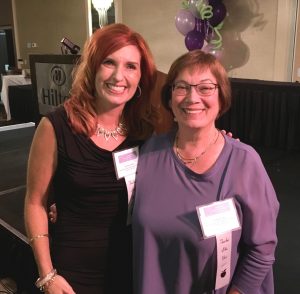
2017-18 Contra Costa County Teachers of the Year: Marissa Ware, San Ramon Valley USD & Paula Raj, West Contra USD. Photo by CoCo Office of Education
Close to 500 friends, family and colleagues attended the annual Contra Costa County Teacher of the Year (TOY) Dinner Gala at the Concord Hilton Hotel, on Thursday evening, Sept. 28 to see Marissa Ware and Paula Raj awarded with the 2017-18 honor. Ware teaches in the San Ramon Valley Unified School District and Raj teaches in the West Contra Costa Unified School District. The county TOY program is produced by the Contra Costa County Office of Education (CCCOE).
After being named TOY by their respective Contra Costa County school districts, then passing a rigorous application screening, followed by a panel classroom observation and interview, and concluding with a speech presentation, the two winners will represent Contra Costa County as its 2017-2018 Teachers of the Year. Ware and Raj will then participate in the California State Teacher of the Year Program.
The festive evening included the 22 celebrated TOYs from throughout the county (see this year’s Class of 2017-2018), along with their families and friends, as well as numerous educators (K-college), business executives representing the sponsors, local government, and local political representatives. The El Cerrito High School Jazz Ensemble, directed by Keith Johnson, provided the evening’s musical entertainment and Contra Costa County Superintendent of Schools Karen Sakata served as master of ceremonies.
Each of the four finalists, including Kari Stewart of the Walnut Creek School District and Tom Trowbridge of the Mt. Diablo Unified School District, were introduced by a former student, with an inspiring five-minute speech – the same speeches given at the TOY Speech Presentations in early August.
This year’s two Contra Costa County TOYs join the long list of other finalists, dating back to the 1972-1973 school year.
Read MoreThe Board of Directors of the East Contra Costa Fire Protection District is pleased to announce that Brian Helmick has accepted an offer to serve as Fire Chief, effective immediately.
At its meeting on October 2, the East Contra Costa Fire Protection District Board of Directors voted unanimously to offer the permanent Fire Chief position to Helmick, who has been serving as Interim Fire Chief since March 31, 2017.
Chief Helmick started with the District as a firefighter in 2002. Chief Helmick successfully worked through the ranks and was promoted to Battalion Chief in July 2006, serving as the District’s Operations Chief leading up to his appointment as Interim Fire Chief.
Chief Helmick has offered the following statement on the appointment:
“I am honored and privileged to assume this role, to serve the Board and this community, and to lead and work alongside the firefighters and other hard-working professionals who provide fire and emergency response in this District every day and every night. I am honored that the Board has placed its trust in me – and in the support my family will provide to me as I take on this role in a permanent capacity. This is a tremendous opportunity and I do not take the responsibility lightly.”
“I look forward to working with the Board and the community to develop and implement a plan to provide even better fire services to this community, which I, too, call my home,” Helmick added.
“I am thrilled that Chief Helmick has accepted this position,” said Board President Joel Bryant. “It has been gratifying and immensely encouraging to see Chief Helmick’s development over these last 15 years, and especially over the last six months he has served as our Interim Chief. Today is a very good day for the District, and I expect many more good days under Chief Helmick’s leadership.”
The economic terms approved by the Board of Directors on March 6, 2017 for Helmick’s service as Interim Chief will remain in place while the District and Chief Helmick negotiate a new employment agreement, which will be presented for Board approval in the coming months.
For more information about the district visit www.eccfpd.org.
Read MoreHomicide Detectives from the Contra Costa County Office of the Sheriff have arrested two suspects in the killing of 49-year-old Aleli Avila of San Francisco. Her body was found on a roadway on August 22, 2017, at about 3:50 PM, in the area of 500 Camino Diablo Road in Byron. (See related article)
Detectives on Tuesday arrested 44-year-old Alex Estrada of Antioch. He was arrested in Pittsburg. Estrada was booked into the Martinez Detention Facility on a murder charge. The D.A.’s Office has since formally charged him. Estrada is being held in lieu of $1 million bail.
Friday morning Detectives arrested 60-year-old Rodolfo Manalo of San Francisco. He was arrested in Daly City. Manalo was booked on a murder charge. He is being held in lieu of $1 million bail.
Detectives worked continuously on the Avila murder investigation. They interviewed numerous people, collected evidence, and followed up on all leads. They were able to obtain arrest warrants for both Estrada and Manalo.
The investigation is ongoing. The motive is still being determined. Anyone with any information on this case is asked to contact the Investigation Division at (925) 313-2600 or call the anonymous tip lines at (925) 313-1166 or (866) 846-3592. Tips can also be emailed to:tips@so.cccounty.us.
Read More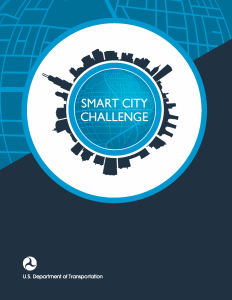 Washington, DC – Today, Wednesday, October 4, 2017, as we recognize National Smart Cities Week, U.S. House Transportation and Infrastructure Committee Members Representatives Mark DeSaulnier (D-CA) and Lloyd Smucker (R-PA) announced bipartisan legislation that would establish $100 million in new grant funding for cities to invest in and use innovative technologies and solutions for the purpose of improving transportation and mobility. The Moving FIRST Act (H.R. 3901) was introduced to build upon the Department of Transportation’s Smart Cities Challenge, by increasing the funding available and making it an annual grant opportunity.
Washington, DC – Today, Wednesday, October 4, 2017, as we recognize National Smart Cities Week, U.S. House Transportation and Infrastructure Committee Members Representatives Mark DeSaulnier (D-CA) and Lloyd Smucker (R-PA) announced bipartisan legislation that would establish $100 million in new grant funding for cities to invest in and use innovative technologies and solutions for the purpose of improving transportation and mobility. The Moving FIRST Act (H.R. 3901) was introduced to build upon the Department of Transportation’s Smart Cities Challenge, by increasing the funding available and making it an annual grant opportunity.
“Seventy five percent of all Americans are expected to live in urban areas by 2050. We need to invest in the best way to move our people and our goods in ways that reduce congestion, improve public health, and are tailored to the needs of our communities,” said DeSaulnier. “We’ve already seen how smart technologies succeed in the Bay Area and California, and I am proud to partner with my colleague Representative Smucker to create grant opportunities for cities across the nation, and of all sizes, to advance cutting edge technologies.”
“This week is National Smart Cities Week – a perfect time to refocus our efforts in support of innovative and creative solutions to help our cities work better,” said Smucker. “Investments in smart infrastructure projects help move people to job centers, products to market, and connect economic hubs. Expanding initiatives like the Smart Cities Challenge will help kick start improvements in transit and connectivity in cities like Lancaster and Reading. I am glad to work with Rep. DeSaulnier to introduce the Moving FIRST Act and I look forward to continuing my work to improve our nation’s infrastructure.”
H.R. 3901 would make annual grant awards available to communities of all different sizes which seek to advance projects like autonomous vehicle technology and sensor-based infrastructure in order to meet the transportation challenges they face. Specifically, the bill establishes the Strengthening Mobility and Revolutionizing Transportation (SMART) Challenge Grant, which will annually award:
- A large city with up to $50 million in grant funding
- A mid-sized city with up to $50 million in grant funding
- Two rural communities or regional partnerships with up to $20 million in grant funding or 20% of the total funds available
Senators Catherine Cortez Masto (D-NV) and Richard Burr (R-NC) introduced companion legislation, S. 1809, in the Senate.
National Smart Cities Week brings together city leaders, innovative companies, and policymakers to engage in a national dialogue to better understand and prepare for the ways new technologies will impact the cities of the future.
Read MoreCentral County high school students get first-hand experience of modern manufacturing
WHAT:
This Friday morning, close to 250 Contra Costa County Career Technical Education/Regional Occupational Program (CTE/ROP) high school students will be visiting local modern industrial businesses, in observation of Manufacturing Day.
National Manufacturing Day, started in 2012, is an annual celebration of modern manufacturing, during which manufacturers invite their communities — including students, educators, business people, media, and politicians — to their facilities in a collective effort to educate visitors about manufacturing career opportunities and improve public perceptions of manufacturing. By working together during and after Manufacturing Day, manufacturers will begin to address the skilled labor shortage they face, connect with future generations, strengthen the public image of manufacturing, and ensure the ongoing prosperity of the whole industry.
WHO:
More than 250 students, currently attending CTA/ROP engineering/industrial-related courses at Antioch High, Mt. Diablo High, Concord High, and Ygnacio Valley High will be visiting local modern manufacturing businesses to get a first-hand look at their hosts’ operations, and possible career opportunities.
The Contra Costa County CTE/ROP serves nearly 12,000 students annually with classes in 34 high schools throughout Contra Costa and Alameda counties. Currently, there are 399 state-of-the-art career development classes in this program. CTE/ROP focuses on career preparation and exploration, hands-on experience, and academic excellence to prepare students for success in college and future careers. CTE/ROP provides students with the newest equipment, rigorous academic standards, and classes in emerging technologies. All of the CTE/ROP classes and programs are directed by and funded through the CCCOE. For more information about CTE/ROP classes, visit their website.
WHEN:
Friday, October 6, 2017; primarily between 9:00-11:00 a.m.
WHERE:
Fresenius (dialysis equipment manufacturer), 4040 Nelson Ave. Concord
Dow (Dow Chemical operations), 901 Loveridge Rd. Pittsburg
Bishop-Wisecarver (producers of custom complex assemblies, linear motion solutions and optimal embedded intelligence systems), 2104 Martin St., Pittsburg
QuickMount (solar roof mounts), 2700 Mitchell Drive, Walnut Creek
Granberg (chain saw mills and accessories), 1051 Los Medanos St. Pittsburg
Read More





